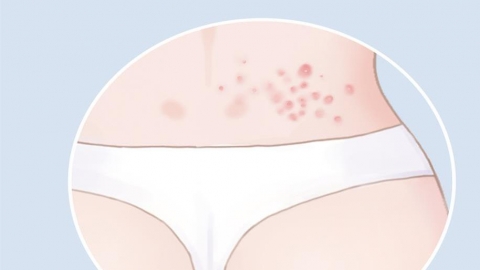What does it mean if IgG for Herpes Simplex Virus Type 1 is elevated, and what should I do?
Generally, an elevated level of herpes simplex virus type 1 (HSV-1) IgG antibodies may result from residual antibodies from a previous infection, temporary immune system fluctuations, recent viral reactivation, concurrent oral herpes, or infections related to immune deficiency. It is recommended to seek timely medical consultation to identify the underlying cause and then improve the condition under a doctor's guidance through lifestyle adjustments, medications, and other methods. The detailed analysis is as follows:

1. Residual Antibodies from a Previous Infection: If you have previously been infected with HSV-1, your immune system may have produced antibodies that remain in your body long-term, causing elevated IgG levels during testing. This typically does not cause obvious symptoms. No specific treatment is required, but it is important to maintain a regular routine, avoid staying up late, eat a balanced diet rich in protein and vitamins, exercise moderately, and enhance immunity to prevent viral activation.
2. Temporary Immune Fluctuations: Excessive fatigue, high psychological stress, or exposure to cold may temporarily weaken immunity, possibly causing slight fluctuations in antibody levels and elevated IgG. Adjust your lifestyle rhythm, ensure 7–8 hours of sleep daily, relieve stress through mild exercises like walking or yoga, avoid smoking and alcohol consumption, and reduce the risk of ongoing immune decline.
3. Recent Viral Reactivation: The dormant virus in the body may become reactivated, causing mild infection and elevated IgG levels, which may be accompanied by slight itching or small red rashes on the lips. Follow your doctor's instructions to take medications such as acyclovir tablets, valacyclovir tablets, or famciclovir capsules, and apply acyclovir cream topically.
4. Concurrent Oral Herpes: The virus may cause oral mucosal herpes, resulting in blisters, pain, or ulcers, along with elevated HSV-1 IgG levels. Follow medical advice to treat with medications such as acyclovir tablets, Kangfuxin solution, or famciclovir capsules.
5. Concurrent Immune Deficiency–Related Infections: Long-term use of immunosuppressive agents or underlying diseases causing weakened immunity may lead to recurrent viral infections, resulting in persistently elevated IgG levels and recurring symptoms. Under a doctor's guidance, adjust the dosage of immunosuppressants and use antiviral medications such as acyclovir injection, foscarnet sodium injection, or valacyclovir dispersible tablets to control the viral infection.
In daily life, maintain good personal hygiene, avoid sharing towels or eating utensils with others, and reduce the risk of viral transmission. Keep a positive mindset, avoid excessive anxiety, and strengthen your physical condition through long-term regular作息 and appropriate exercise to reduce the frequency of viral recurrence and maintain bodily stability.










